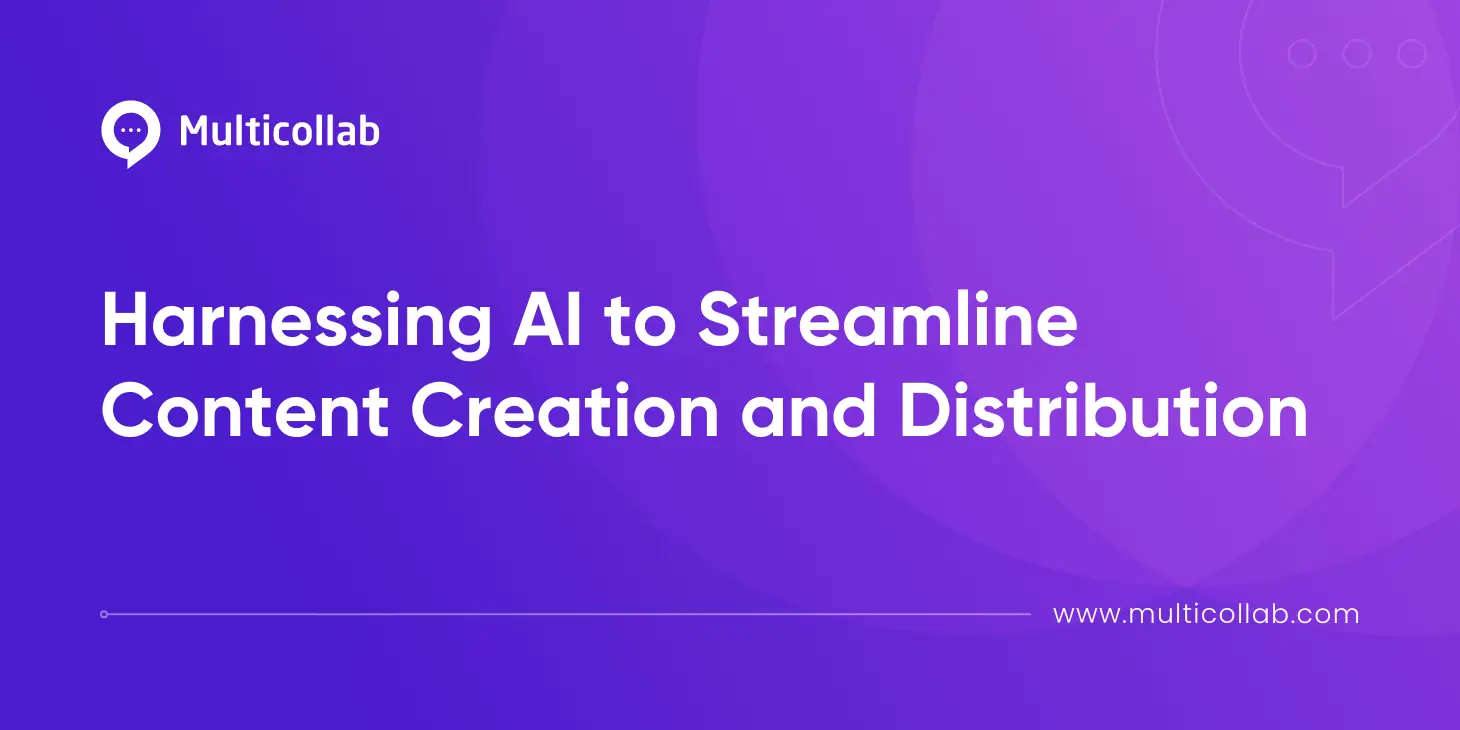Table of Contents
Artificial intelligence’s (AI) growing role in this field is revolutionizing how content is generated, edited, and distributed, providing creators with advanced tools to enhance productivity and creativity. From generating written content to producing high-quality videos and images, AI technologies are streamlining processes that were once labor-intensive and time-consuming. The integration of AI into content creation not only accelerates the production timeline but also opens up new possibilities for innovation and personalization.
The importance of streamlining content processes in the digital age cannot be overstated. As the demand for fresh, engaging content increases, creators and marketers face the challenge of maintaining high standards while managing tight schedules. AI addresses this need by automating repetitive tasks, optimizing content for different platforms, and providing insights into audience preferences. This efficiency allows creators to focus on strategic and creative aspects, ensuring their content remains relevant and impactful in a rapidly evolving digital landscape.
AI Tools for Content Creation
AI-powered writing assistants, such as GPT-4 and Jasper, have become invaluable tools for content creators. These sophisticated programs can generate high-quality text based on minimal input, making producing articles, blog posts, and social media updates easier. They can also assist with grammar and style improvements, ensuring the final output is polished and professional. By leveraging natural language processing (NLP) capabilities, these tools can adapt to different tones and styles, catering to a wide range of content needs.
Beyond writing, AI is making significant strides in video creation and editing. Automated video tools can now produce professional-quality videos with minimal human intervention. These tools use AI to analyze raw footage, select the best clips, and compile them into cohesive stories. They can add transition effects and even generate voiceovers, significantly reducing the time and effort required to create compelling video content. Similarly, AI-driven image generation and editing tools, like DALL-E, enable creators to produce unique visuals and enhance existing images easily.
Enhancing Content Quality with AI
AI plays a pivotal role in enhancing the quality of content through various innovative tools. Grammar and style-checking tools like Grammarly have become essential for writers producing error-free and polished text. These AI tools utilize advanced algorithms to detect grammatical errors, suggest stylistic improvements, and even identify potential issues with tone and readability.
Beyond improving grammar and style, AI is instrumental in fact-checking and data verification. AI-powered tools can cross-reference information against reliable databases and sources, flagging discrepancies or potential inaccuracies. This capability not only enhances the credibility of the content but also saves significant time that would otherwise be spent on manual verification. Additionally, AI allows for personalization and customization of content, tailoring it to the preferences and behaviors of individual users.
Automating Content Distribution
AI-driven social media scheduling and management tools are indispensable tools for content marketers. These tools analyze audience activity patterns to determine the optimal times for posting, ensuring maximum reach and engagement. They can also automate the posting process across multiple platforms, monitor interactions, and provide insights into performance metrics. This automation saves time and ensures a consistent and effective social media presence.
Automated email marketing and personalization are other areas where AI excels. AI can segment email lists based on various criteria, such as user behavior, preferences, and demographics, ensuring that each recipient receives relevant and personalized content. AI-powered tools can also optimize email subject lines, content, and send times to increase open rates and conversions. Additionally, programmatic advertising and targeting leverage AI to deliver highly targeted ads to the right audience at the right time. By analyzing user data and behavior, AI can place ads on platforms where they are most likely to be seen by potential customers, thereby improving the efficiency and effectiveness of advertising campaigns.
SEO and AI
The integration of AI into search engine optimization (SEO) practices has revolutionized how content creators and marketers approach keyword research and optimization. AI tools for keyword research analyze vast amounts of data from search engines to provide insights into keyword trends, search volume, and competition, enabling content creators to tailor their strategies effectively. By automating the keyword research process, AI ensures that content is optimized to meet the evolving demands of search engine algorithms while saving time.
Enhancing content discoverability with AI extends beyond keyword optimization. AI can analyze user behavior and preferences to suggest content more likely to engage and retain visitors. This includes optimizing meta tags, headlines, and even the structure of the content to align with search engine preferences.
Content Performance Monitoring and Analytics
AI’s impact on content performance audit and analytics is profound. It offers real-time insights that enable content creators and marketers to make data-driven decisions. These tools provide real-time reporting, allowing creators to monitor the effectiveness of their content and make necessary adjustments promptly. AI can also segment data based on different criteria, offering a more granular view of how specific audience segments interact with content.
Sentiment analysis is another powerful application of AI in content analytics. By analyzing social media interactions, comments, and reviews, AI can gauge audience sentiment and provide insights into how content is perceived. This feedback is invaluable for refining content strategies and ensuring the content resonates with the target audience. Additionally, AI aids in measuring return on investment (ROI) by tracking conversions, lead generation, and sales attributed to specific content pieces. This comprehensive analysis helps marketers optimize their strategies to achieve better results.
Preventing automated spam content is critical to maintaining content integrity and ensuring a positive user experience. AI can detect and filter out bot traffic, spam emails, and other forms of automated spam content. Tools like Akismet and Google’s reCAPTCHA use machine learning to identify suspicious activity and prevent it from impacting website performance and user experience. By leveraging AI to monitor and eliminate spam, content creators can ensure that their audience engages with genuine and valuable content, thereby maintaining the credibility and effectiveness of their content distribution efforts.
Future Trends in AI and Content Creation
As we look to the future, emerging AI technologies in content creation and distribution promise to further revolutionize the industry. Innovations like AI-driven real-time content editing tools are set to become even more sophisticated, offering enhanced capabilities for writers, designers, and marketers. These tools will streamline the editing process and provide real-time feedback and suggestions, enabling creators to produce high-quality content more efficiently. Additionally, advancements in natural language processing (NLP) and machine learning will lead to more intuitive AI assistants capable of generating virtually indistinguishable content from that created by humans.
The future of collaboration in content creation is poised to be synergistic, combining the best of both worlds. AI will handle repetitive, data-driven tasks, allowing humans to focus on creative and strategic elements. This collaboration will lead to the production of more engaging and personalized content. For instance, AI can analyze vast datasets to identify trends and audience preferences, while human creators can use these insights to craft compelling narratives and visuals.
Predictions for the next decade indicate that AI will continue to play a crucial role in shaping the content creation landscape. We can expect AI to become more integrated into all stages of content production, from ideation and creation to distribution and analysis. AI-driven tools will become increasingly user-friendly, making them accessible to a broader range of creators, regardless of their technical expertise. Furthermore, as AI technology evolves, it will open up new possibilities for immersive and interactive content, such as virtual reality (VR) and augmented reality (AR) experiences, offering audiences more engaging and dynamic ways to consume information.
Conclusion
In summary, integrating AI into content creation and distribution has had a transformative impact on the industry. AI-powered writing assistants, automated video and image tools, and sophisticated analytics platforms are just a few examples of how AI enhances the efficiency and quality of content. Real-time content editing tools are revolutionizing how creators refine their work, ensuring high standards and consistency across all media formats. Additionally, AI-driven tools for SEO, content performance monitoring, and spam prevention are helping marketers reach their audience more effectively and maintain the integrity of their content.
The transformative potential of AI in content creation and distribution is immense, promising continued innovation and improvement. As AI technology advances, we can anticipate even more significant enhancements in efficiency, personalization, and collaboration. The future of content creation will likely see an even closer partnership between AI and human creativity, leading to more engaging, high-quality content that meets the evolving needs of audiences.







